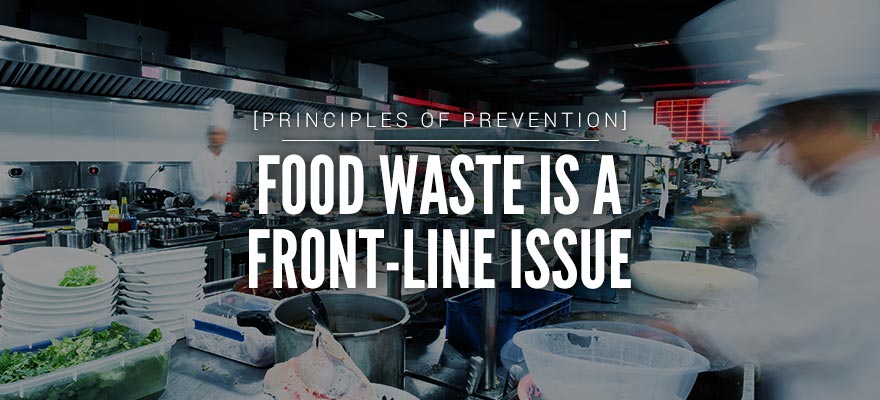Principles of Prevention: Food Waste is a Front-Line Issue

One of the myths we often hear in foodservice related to food waste is that if you have food waste, it means that a chef or manager isn’t doing his/her job (check out our full food waste myths post here). And while reducing food waste certainly needs to be on the management agenda, solving food waste doesn’t come from a management edict or better IT, solving food waste is about shaping behaviors.
Running an operation that’s committed to food waste minimization starts at the front-line with engagement and behavior change. Following are critical success factors for front-line engagement:
Make food waste a safe topic.
Always start with this one. Staff members can’t be afraid to talk about waste, or else they may feel a need to hide the facts or distance themselves from the issue. Talk about food waste openly and honestly, and make sure people understand they won’t get in trouble for it.
Explain that every operation has food waste, even the best. Make it clear that by working together, your employees and managers can make a tangible impact on this issue. Perhaps highlight success stories of individuals and operations who have made great strides in the fight against food waste, from activist Rob Greenfield dumpster-diving his way across the United States, to Saint Norbert College cutting waste by 32% in a matter of months.
Above all else, keep it positive.
Require staff to measure any kitchen food waste they discard.
This raises their individual awareness about the problem and makes it personally relevant as they think about the time and labor that went into a wasted product. With LeanPath systems, we show the value of the food that’s being tossed, which really causes employee to pause and reflect, thinking about how that compares to their hourly or even daily wages. People police themselves proactively when they’re aware that their actions have consequences, and that others care about those consequences.
Educate your team on the true cost of food waste to help them realize just what it means when food is wasted. Understanding the many negative effects – particularly the non-financial impacts on our environment -- of tossing food may be what’s needed to motivate them to fight food waste.
Provide immediate feedback and recognition to staff.
Present information about food waste in a vivid way to illustrate the significance of the food waste (or waste prevention). At LeanPath, at times we’ve talked about waste in terms of weight and the equivalent mass represented in elephants, thereby letting our clients know how many “elephants” of waste they’ve reduced since starting the program. People might not remember specific numbers, but they’ll cling on to something vivid like preventing 5 “elephants” worth of waste. (For those of you wondering, the average African elephant weighs about 9,500 lbs.)
Set SMART goals.
Specific, measurable, actionable, realistic, and time-bound, that is. Always have a very specific (i.e. specific food item you want to waste less) goal in place in your kitchen and make sure everyone in the kitchen knows what it is. Write it on a big white board. Talk about it in your stand-ups. Also make sure that everyone knows how you’re tracking toward that goal, and celebrate when you reach it!
As an executive chef or manager, your job isn’t to control waste on your own, it’s to engage and inspire your front-line team so they each develop an individual commitment to minimizing food waste every day.
